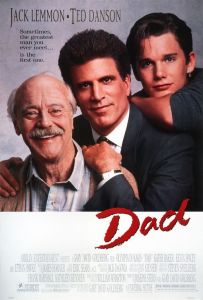
Say what you will about Jack Lemmon – and this veteran actor can sometimes be accused of relying on mannerism and his considerable bag of tricks – the man always appears to be willing to take a chance. In his latest film, Dad, Lemmon sheds 30 pounds and his head of hair to play a fragile old man in his 70s.
Lemmon is all weariness and sighs as he begins the film. He’s accustomed to being cared for by his wife (Olympia Dukakis, the Oscar-winning mother from Moonstruck), who’s the boss of the place. When she has a heart attack and is recovering, their son (Ted Danson) flies in from the other coast and re-establishes his relationship with his father, while the old man learns to care for himself. And to enjoy it.
This is a subject for a film in itself, but writer-director Gary David Goldberg has a more complicated scheme in mind. Lemmon’s character is then diagnosed with cancer, which leads into a deeper family crisis; also involved are a daughter (Kathy Baker), her husband (Kevin Spacey) and Danson’s son (Ethan Hawke), who is himself estranged from his own father.
This is a movie that raises thoughtful issues in moving and comic ways. There are many delightful sequences, including Lemmon’s rejuvenation during a remission stage, where he struggles to come out from under his wife’s domineering ways by indulging in a flamboyance that he has never expressed.
Although it is a laudable attempt, Goldberg, who is best known as the creator of TV’s Family Ties, may have bitten off more than he can comfortably chew. Goldberg is a “reality” director, with an unremarkable style that emphasizes the everyday. He veers toward the raised consciousness of the baby boomers, with particular attention to emotionally constricted men.
Dad is reminiscent of Parenthood in its attractions and its limits; both movies tap intelligently into universal family concerns, but both have a trace of patness, of difficult issues wrapped up to bring everything to television-size.
Danson does his best big-screen work, though it tempting to imagine what Tom Hanks, who has often been called a successor to Jack Lemmon, might have done with the role. Lemmon achieves some lovely scenes, especially his recollection, on his hospital bed, of a really tremendous catch in the 1947 World Series. “I know I should be having very deep thoughts at a time like this,” he apologizes. But Lemmon makes the moment seem deep enough.
First published in The Herald, October 29, 1989
Yeah, I don’t know, everything sounds wrong about this movie. Apparently I was a little sympathetic. I mean that is a pretty good cast, what with Baker and Spacey as a couple. It was based on a novel by William Wharton, who wrote Birdy and A Midnight Clear. Steven Spielberg was an executive producer.